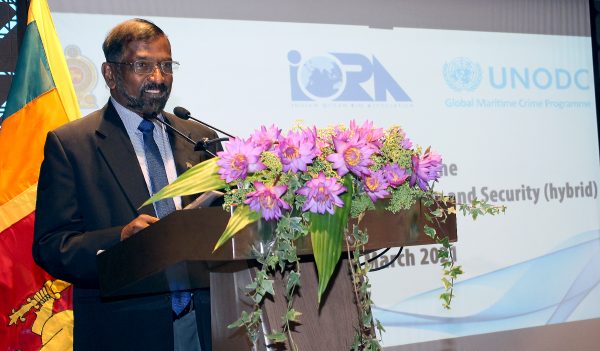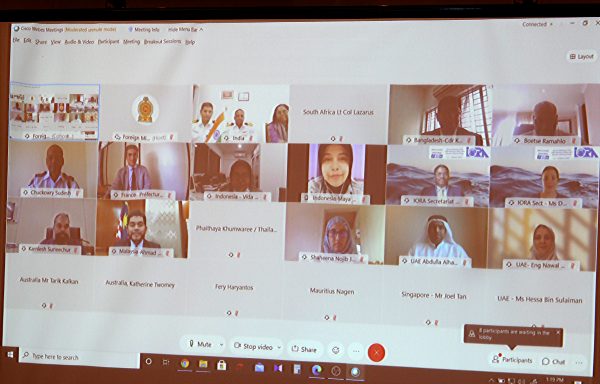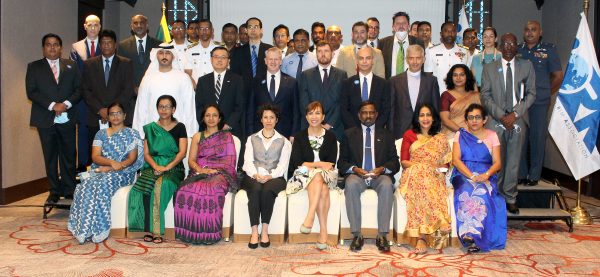
Good morning Ladies and Gentlemen, Excellencies,
Hannah Singer, the U.N. Resident Coordinator in Colombo
Dr. Gatot H. Gunawan, Acting Secretary General of IORA,
Your Excellencies, Members of the Diplomatic Corps,
Mr. Alan Cole, Head of United Nations Office on Drugs and Crime, Global Maritime Crime Programme and the generous support from the Government of Japan,
Senior Officials representing the Navy and other stakeholders in Sri Lanka, Distinguished delegates from IORA Member States who are joining us virtually.
Let me welcome you all, with the traditional Sri Lankan greeting, Ayubowan! May you all live long, especially in this COVID pandemic period, we need that wish more than ever. And of course, unfortunately there is another wave going up in many parts of the world, so this is not yet over.
And I am happy that we were instrumental in getting you the vaccination, most of you, and we made our diplomatic community in Colombo a priority in the vaccination programme although we have only received a very limited quantity because we consider that you are our guest. We have a responsibility to look after you first before we look after ourselves.
So, allow me to extend a warm welcome to the French Republic, the newest member of the IORA.
Excellencies, ladies and gentlemen, it gives me a great pleasure to welcome you to the second meeting of IORA Working Group on Maritime Safety and Security. And we call it the IORA WGMSS.
I like to extend a warm thank you for all those who are present here physically, this is a challenging time. Even to conduct an event physically is a challenge. Of course, we maintain the health protocol and also those who are joining us virtually from across the Indian Ocean. And I also like to thank the Ocean Affairs Division led by my able colleague Hasanthi and her wonderful team in the Foreign Ministry for coordinating and making this event a reality. And let me also thank all those who have assisted in organising this event and also working on this working group with the intention of deriving a positive outcome.
But I must say now time has come to translate our discussion into action. We have been discussing about this maritime safety and security for quite some time. Yes, we have achieved things, but I think it's high time that we really translate our talk into the action. Also, I like to thank, as usual, our partner, the Global Maritime Crime Program of the United Nations, under the able guidance of our dear friend Alan Cole, who is always there with us in anything regarding the ocean and the Lakshman Kadirgamar Institute and also special thank goes to the government of Japan for generous contribution to make this event a reality.
And I also like to thank the IORA member states on behalf of the government of Sri Lanka for the for extending their unstinted support during the last few years that we were in the helm of maritime safety and maritime security. You all know, or probably you may be knowing that Sri Lanka has offered to be the vice chair for the tenuous starting in 2020. And we have received great support from the IORA members, and we really appreciate that as well. We are committed and pleased to provide its utmost support to IORA Secretariat and the member states in achieving our common objectives across the Indian Ocean.
Sri Lanka conducted the first meeting in August 2019, and of course, we were hoping to conduct the second meeting in 2020, but unfortunately, we could not do it physically. And then when we tried to do it virtually, it was taking time because all of us are busy with different scenarios across the globe. But finally, we are happy we could do this today.
We know that global politics, shifting already or shifted to the oceans, that's for sure, and we also know the Indian Ocean is either already or rapidly becoming a key ocean in global politics, global maritime affairs and also the Indian Ocean littorals about 35 percent of world population and one fifth of global GDP is in the region of the Indian Ocean. And also, it is estimated that by 2025, this region could be the source of a quarter of world economic output and around 15 percent of its trade. This prosperous future will be linked to the ocean.
Now, ladies and gentlemen, we all think the ocean is about shipping and we all think that the data we get on our smartphones is coming from the sky. But the real fact is it is coming under the deep ocean through submarine cables. We know that 80 percent of internal Internet traffic is transferred through submarine cables. And I'm happy that Sri Lanka, again, together with the UNODC, has taken the initiative to ensure security of this very vital lifeline of the world, so to say, because we all know, I don't know how long we can survive without the Internet, if we can survive a day, I think that's an achievement. But then all these cables are they are in the deep ocean. And when they are in the ocean, accidents can happen. Natural disasters can take place. So how do we secure these vital submarine cables across the Indian Ocean? That's something we really need to pay a lot of attention to.
The ocean is very dynamic. It is changing every time. I mean, what we discussed last year may not be relevant this year. Of course, there are certain common things like maritime crime. We call it the maritime crime trinity, that is drugs, human smuggling and weapons smuggling. It is prevalent. Illegal, unreported and unregulated fishing is there. The FAO report released a few weeks ago said 40 percent of fishing taking place in the Indian Ocean is IUU fishing.
Now, IUU fishing is not only taking the catch, but destroying the environment, marine environment as well. And we all know that the illegal narcotics trade is there. Of course, you can see that in Sri Lanka, the drug trade is going down, but still it is coming in different forms. When we tackle one particular type, there is another type emerging because it is a very lucrative business.
And then environmental or marine environmental pollution is taking place. And we need to appeal to the big countries because, you know, per capita, they pollute more than a small country. And we already know there is a 60,000 square kilometre dead zone in the Bay of Bengal, no life, no fish, no marine life. And we all know there is a huge garbage patch in the southern part of the Indian Ocean, and we keep adding at least 8 million metric tons of plastic every year. So very soon, ladies and gentlemen, there'll be more plastic in the ocean than the fish. So, this is the danger.
Now, again, I have to say that I do see another three trends emerging or already emerged in the Indian Ocean. Number one, politicisation of the maritime trade. Number two, politicisation of maritime related infrastructure. Number three, increased militarisation of the Indian Ocean. I can argue with anyone with facts and figures and examples. These three trends are taking place across the Indian Ocean. Now, in this backdrop, why do we need as Indian Ocean littorals? And I have a simple answer. Why do we really need? We need international rules based maritime order. And enhance maritime trade connectivity. These are the two things the majority of countries in the Indian Ocean rim area or the region wants, we need a rules-based because we have a huge asymmetry in this region. All the countries are not equal. All the militaries and all the navies are not equal. So, the best way to overcome this asymmetry is having an international rules-based maritime order. But is that enough? Only by having an international rules-based maritime order is that enough, is my question. It is not enough. Then what do we need? We need enhanced maritime connectivity and to be part of the global supply chain and the maritime trade.
And therefore, the theme of IORA after adapting, strengthening maritime cooperation for a peaceful, stable and prosperous Indian Ocean. Now, this is a critical challenge that we have, and we have been talking about this strengthening maritime cooperation for a peaceful, stable and prosperous Indian Ocean. But then look at 2021. Have the nations become prosperous in the Indian Ocean? I mean, when I say all nations and the answer is no. And one of the major predicaments of many littoral countries in the Indian Ocean is lack of quality maritime infrastructure. Now, without that, how can we enhance maritime connectivity? We all know South Asian region. We are the least integrated region in the whole world. Only less than five percent of our combined GDP is economically integrated. So where are we heading? We can understand.
Now in 2019, Sri Lanka hosted the first working group on maritime safety and security. Ladies and gentlemen, now we are in 2021. Of course, now we are meeting today, and we need to move on. And as I said, it is high time we translate our talking into action. If we don't do that, we can forget about the Indian Ocean because outside powers will take control of the Indian Ocean unless the Indian Ocean littorals can get their act together. This is the warning that I like to present to this forum. Food for thought. Sri Lanka has been doing many exercises, the VBSS exercises, and we supported the Pathfinder Virtual Conference on Indian Ocean Security Conference, again with Japan.
And also, we have supported a webinar ‘Nexus between Maritime Scientific Research and Maritime Safety and Security’, together with the Max Planck Foundation. And we are planning another major, big event with the Max Planck Foundation and the UNODC in the rest of the year as well. So, we have been doing many things to the best of our ability, despite the restrictions imposed by the COVID pandemic. And we are hopeful that this meeting today will lead us to a more productive year ahead, despite the COVID restriction which are still in place. The work plan we have will serve as the base and the initiatives to be implemented by this working group to strengthen cooperation, harmonizing and information sharing on best practices in maritime safety and security.
But ladies and gentlemen, I think it is time we take stock of these three concepts. How far have we gone? How much have we achieved? And unfortunately, I think the pollution level is still high. I think the IUU fishing is still high, maritime crime is still high. Mistrust and trust deficiency are still high. So, when we look back, I don't know whether we can be extremely happy with the progress that IORA has made.
And I feel that we have a very long way to go if IORA is to be a meaningful organization contributing to these very concepts that we hold dear. So, I assure you that Sri Lanka is committed to continue its contribution and leadership towards achieving objectives of this working group. We gained a lot of experience fighting at sea for 30 long years with the terrorist group, the only terrorist group in the world so far, which had a nearly conventional standing army, a small Navy and Air Force. No other terrorist group had ever had that. But here we fought it. So, we gained a lot of experience at sea. I think after the Falklands War in 1982, the only operational navy which actually engaged in actual combat is the Sri Lankan Navy. So, we combined that experience and expertise into the Working Group on Maritime Security and Safety.
We are entering a very contemporary, challenging world. We need to be together. We need to work together. No single country can be the next net security provider. No single country can be the net developing provider in the Indian Ocean.
I'm sure we agree that it requires a coordinated multilateral approach to maritime security unless we can get this multilateral combined approach. Even without us knowing, another threat can emerge in the maritime domain. Our success, and the success of generations yet unborn will depend on the decisions we make today. If we make the right choices, the future generations will remember us. If we don't make that choice, they will curse us. And I believe we have no right to rob from the future generations their future, they should be enjoying the ocean that we enjoyed. So we need to work together collaboratively, multilaterally, with a sincere commitment to achieve tangible, measurable results, not only meeting, talking, producing reports and then coming back and meeting again and producing another report. It looks very attractive to have so many reports, but it is high time that we walk the talk as the Indian Ocean Rim Association.
With this, ladies and gentlemen, I conclude my keynote address. Once again, I'm delighted to see all of you here. I see a lot of ambassadors, high commissioners are here, it's a great feeling. Thank you once again for being with us this morning. And I wish you happy sailing.
Thank you.



